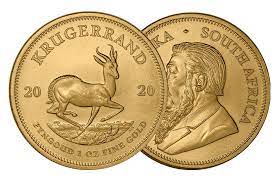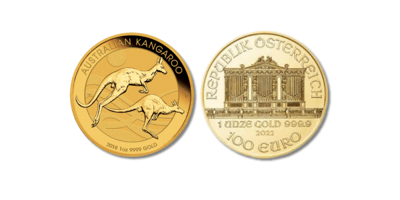The Covid-19 Pandemic. The 2008 Recession. The Dot-Com Bubble Burst. What do all these things have...
Gold in 2023: Let's Get Physical
Gold is down just $10 for 2022, holding steady in an environment where all assets are deflating, whereas equities markets have taken a dramatic downturn. So how does one get into gold as a savvy and timeless investment?

There are four common ways investors typically purchase gold:
- Gold Jewelry: Although gold in the form of jewelry has been a popular way of storing and expressing wealth for several millennia, gold jewelry is not a very rewarding form of investment. The markup on gold jewelry makes it unlikely that you will be able to recoup your investment or make money on top of it later, but for many cultures it is still seen as a store of wealth. The last gold bull market (which coincided with the global recession) was a very favorable time for clients looking to sell gold family heirlooms at the height of their value. “It’s like bullion you can wear,” we like to say.
- Physical Gold: While it might not make sense to obtain physical gold in the form of jewelry as an investment, gold bullion – coins or bars— is easy to buy and sell, and once purchased, you don’t need to do anything but store it. It is a historically successful tangible asset that can help you maintain your wealth and add diversity to your portfolio.
- Mining Stocks: These tend to be high-risk investments, with the potential for higher profit. They are highly liquid, but highly unreliable. Anything that goes wrong with the mine could affect their value, like poor management, political upheaval, environmental disasters, currency fluctuation, or new taxation rules, which could blindside inexperienced investors. These assets are not recommended for investors without a strong familiarity and working knowledge of how mining stocks and companies work. Guidance from an asset manager would be recommended here.
- Gold ETFs: ETFs (Exchange Traded Funds) are also a higher risk way to buy gold for profit. Many investors look to buy gold in the form of an ETF because they are accustomed to buying stocks and bonds, so it seems like an easy way to obtain gold. However, it is not the same thing as directly owning gold; it is a fund that must be managed. For investors that don't understand the hidden fee structures at play, this could prove costly. Also, most do not allow direct gold distributions.

So which option for buying gold is the right choice for you? Diversification is essential for any portfolio, and it is important to protect yourself against risk. Primarily, investors buy gold as an insurance policy against instability- it can both protect you in volatile political and economic crises and grow in value while you own it, making your gold investment even more valuable.
Towards that effort, almost nothing functions better than physical gold bullion as a form of wealth insurance. As with all investments, the general rule of “buy low, sell high” applies to physical gold, and it’s unlikely gold prices will be “low” for much longer. In the last gold bull market, gold rose to a peak 650% higher than previous lows.
Gold hit new peaks in 2020, and after a period of extended rangebound trading due to the strength of the U.S. dollar and the ongoing rate hike cycle, the precious metals market is again showing signs of life. Gold seems poised for a sustained positive trend in 2023.
We have just one question...got gold?

There is no better time than now to buy, whether for short-term profit trading or long-term wealth insurance.
If you’re looking to buy gold, ASI can help. Email us or call 800-831-0007 to Keep What’s Yours!




